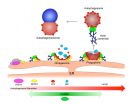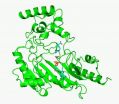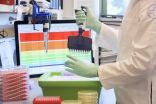(Press-News.org) Want to lose abdominal fat, get smarter and live longer? New research led by USC's Valter Longo shows that periodically adopting a diet that mimics the effects of fasting may yield a wide range of health benefits.
In a new study, Longo and his colleagues show that cycles of a four-day low-calorie diet that mimics fasting (FMD) cut visceral belly fat and elevated the number of progenitor and stem cells in several organs of old mice -- including the brain, where it boosted neural regeneration and improved learning and memory.
The mouse tests were part of a three-tiered study on periodic fasting's effects -- testing yeast, mice and humans -- set to be published by Cell Metabolism on June 18.
Mice, which have relatively short life spans, provided details about fasting's lifelong effects. Yeast, which are simpler organisms, allowed Longo to uncover the biological mechanisms that fasting triggers at a cellular level. And a pilot study in humans found evidence that the mouse and yeast studies were applicable to humans.
Bimonthly cycles that lasted four days of an FMD which started at middle age extended life span, reduced the incidence of cancer, boosted the immune system, reduced inflammatory diseases, slowed bone mineral density loss and improved the cognitive abilities of older mice tracked in the study. The total monthly calorie intake was the same for the FMD and control diet groups, indicating that the effects were not the result of an overall dietary restriction.
In a pilot human trial, three cycles of a similar diet given to 19 subjects once a month for five days decreased risk factors and biomarkers for aging, diabetes, cardiovascular disease and cancer with no major adverse side effects, according to Longo.
'Strict fasting is hard for people to stick to, and it can also be dangerous, so we developed a complex diet that triggers the same effects in the body,' said Longo, Edna M. Jones professor of biogerontology at the USC Davis School of Gerontology and director of the USC Longevity Institute. Longo has a joint appointment at the USC Dornsife College of Letters, Arts and Sciences. 'I've personally tried both, and the fasting mimicking diet is a lot easier and also a lot safer.'
The diet slashed the individual's caloric intake down to 34 to 54 percent of normal, with a specific composition of proteins, carbohydrates, fats and micronutrients. It decreased amounts of the hormone IGF-I, which is required during development to grow, but it is a promoter of aging and has been linked to cancer susceptibility. It also increased the amount of the hormone IGFBP-, and reduced biomarkers/risk factors linked to diabetes and cardiovascular disease, including glucose, trunk fat and C-reactive protein without negatively affecting muscle and bone mass.
Longo has previously shown how fasting can help starve out cancer cells while protecting immune and other cells from chemotherapy toxicity.
'It's about reprogramming the body so it enters a slower aging mode, but also rejuvenating it through stem cell-based regeneration,' Longo said. 'It's not a typical diet because it isn't something you need to stay on.'
For 25 days a month, study participants went back to their regular eating habits -- good or bad -- once they finished the treatment. They were not asked to change their diet and still saw positive changes.
Longo believes that for most normal people, the FMD can be done every three to six months, depending on the abdominal circumference and health status. For obese subjects or those with elevated disease risk factors, the FMD could be recommended by the physician as often as once every two weeks. His group is testing its effect in a randomized clinical trial, which will be completed soon, with more than 70 subjects.
'If the results remain as positive as the current ones, I believe this FMD will represent the first safe and effective intervention to promote positive changes associated with longevity and health span, which can be recommended by a physician,' Longo said. 'We will soon meet with FDA officers to pursue several FDA claims for disease prevention and treatment.'
Despite its positive effects, Longo cautioned against water-only fasting and warned even about attempting the fasting mimicking diet without first consulting a doctor and seeking their supervision throughout the process.
'Not everyone is healthy enough to fast for five days, and the health consequences can be severe for a few who do it improperly,' he said. 'Water-only fasting should only be done in a specialized clinic. Also, certain types of very low calorie diets, and particularly those with high protein content, can increase the incidence of gallstones in women at risk'.
'In contrast,' he added, 'the fasting mimicking diet tested in the trial can be done anywhere under the supervision of a physician and carefully following the guidelines established in the clinical trials.'
Longo also cautioned that diabetic subjects should not undergo either fasting or fasting mimicking diets while receiving insulin, metformin or similar drugs. He also said that subjects with body mass index less than 18 should not undergo the FMD diet.
For the study, Longo collaborated with researchers and clinicians from USC as well as from Texas, Italy and England. The study was funded by the National Institute on Aging.
INFORMATION:
Last June, in the early days of the Ebola outbreak in Western Africa, a team of researchers sequenced the genome of the deadly virus at unprecedented scale and speed. Their findings revealed a number of critical facts as the outbreak was unfolding, including that the virus was being transmitted only by person-to-person contact and that it was picking up new mutations through its many transmissions.
While public health officials now believe the worst of the epidemic is behind us, it is not yet over, and questions raised by the previous work still await answers.
To ...
PHILADELPHIA - Several well-known neurodegenerative diseases, such as Lou Gehrig's (ALS), Parkinson's, Alzheimer's, and Huntington's disease, all result in part from a defect in autophagy - one way a cell removes and recycles misfolded proteins and pathogens. In a paper published this week in Current Biology, postdoctoral fellow David Kast, PhD, and professor Roberto Dominguez, PhD, and three other colleagues from the Department of Physiology at the Perelman School of Medicine at the University of Pennsylvania, show for the first time that the formation of ephemeral compartments ...
University of California San Francisco scientists have identified characteristics of a family of daughter cells, called MPPs, which are the first to arise from stem cells within bone marrow that generate the entire blood system. The researchers said the discovery raises the possibility that, by manipulating the fates of MPPs or parent stem cells, medical researchers could one day help overcome imbalances and deficiencies that can arise in the blood system due to aging or in patients with specific types of leukemia.
Similar imbalances can render patients vulnerable immediately ...
PORTLAND, Ore. -- Advancing the field of structural biology that underpins how things work in a cell, researchers have identified how proteins change their shape when performing specific functions. The study's fresh insights, published online in the journal Structure, provide a more complete picture of how proteins move, laying a foundation of understanding that will help determine the molecular causes of human disease and the development of more potent drug treatments.
Though it has long been recognized that proteins are not static, for more than 30 years, scientists' ...
The secret to preventing HIV infection lies within the human immune system, but the more-than-25-year search has so far failed to yield a vaccine capable of training the body to neutralize the ever-changing virus. New research from The Rockefeller University, and collaborating institutions, suggests no single shot will ever do the trick. Instead, the scientists find, a sequence of immunizations might be the most promising route to an HIV vaccine.
Scientists have thought for some time that multiple immunizations, each tailored to specific stages of the immune response, ...
BOSTON, June 18 -- An analysis of five families has revealed a previously unknown genetic immunodeficiency, says an international team led by researchers from Boston Children's Hospital. The condition, linked to mutations in a gene called DOCK2, deactivates many features of the immune system and leaves affected children open to a unique pattern of aggressive, potentially fatal infections early in life.
As the researchers -- led by Kerry Dobbs and Luigi Notarangelo, M.D., of Boston Children's Division of Allergy and Immunology -- reported today in the New England Journal ...
Musicians don't just hear in tune, they also see in tune.
That is the conclusion of the latest scientific experiment designed to puzzle out how the brain creates an apparently seamless view of the external world based on the information it receives from the eyes.
"Our brain is remarkably efficient at putting us in touch with objects and events in our visual environment, indeed so good that the process seems automatic and effortless. In fact, the brain is continually operating like a clever detective, using clues to figure out what in the world we are looking at. And ...
A trio of studies being published today in the journals Science and Cell describes advances toward the development of an HIV vaccine. The three study teams all demonstrated techniques for stimulating animal cells to produce antibodies that either could stop HIV from infecting human cells in the laboratory or had the potential to evolve into such antibodies. Each of the research teams received funding from the National Institute of Allergy and Infectious Diseases (NIAID), part of the National Institutes of Health.
In one study, published in Science, researchers demonstrate ...
CHAPEL HILL, NC - Before there were cells on Earth, simple, tiny catalysts most likely evolved the ability to speed up and synchronize the chemical reactions necessary for life to rise from the primordial soup. But what those catalysts were, how they appeared at the same time, and how they evolved into the two modern superfamilies of enzymes that translate our genetic code have not been understood.
In the Journal of Biological Chemistry, scientists from the UNC School of Medicine provide the first direct experimental evidence for how primordial proteins developed the ...
Parkinson disease (PD) appeared associated with 16 types of cancer in a study in Taiwan, an effort to explain the association in an East Asian population because most prior research has been conducted in Western populations, according to an article published online by JAMA Oncology.
During the past 50 years, more than 25 epidemiological studies have been conducted on the association between PD and cancer, and most of those studies showed that individuals with PD had a decreased risk of cancer compared to those without PD. However, most of those studies were done in Western ...




